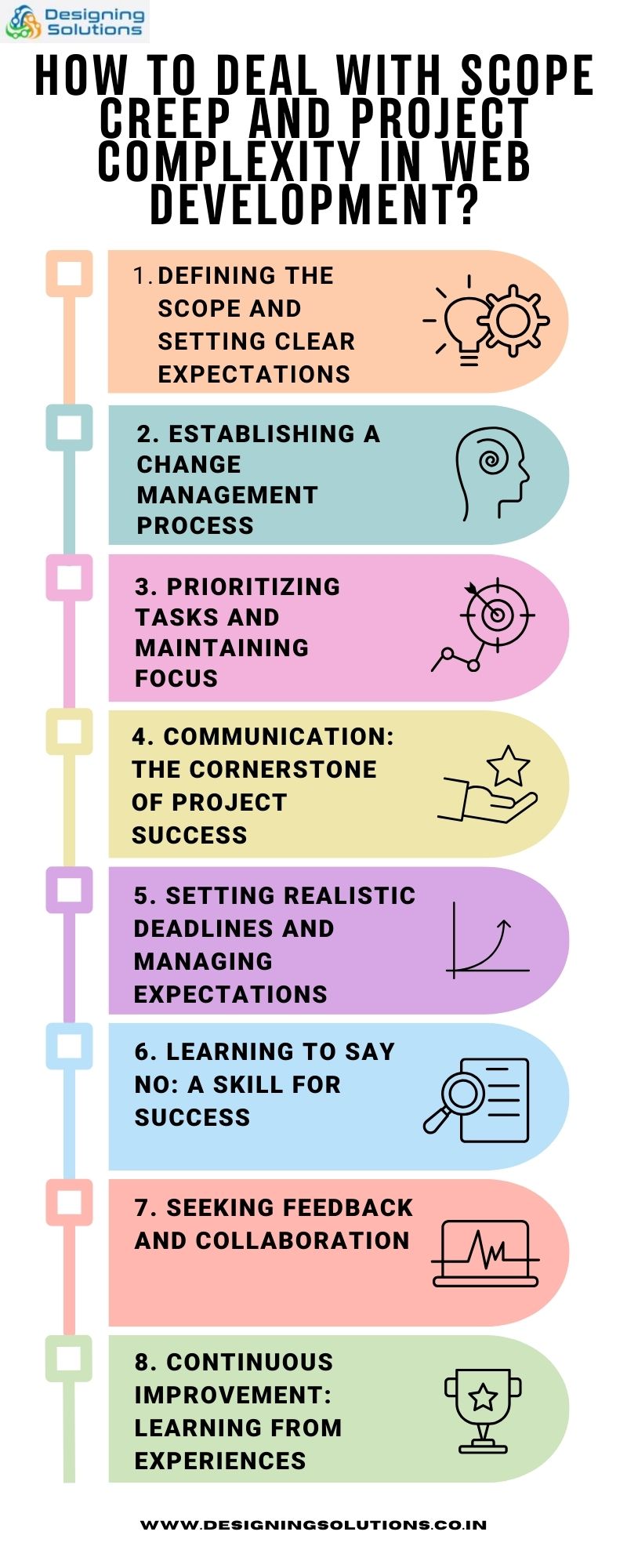Introduction
In the realm of web development, scope creep and project complexity often emerge as formidable foes, threatening to derail even the most meticulously planned projects. These challenges can manifest in various forms, ranging from ever-expanding feature requests to intricate technical complexities that strain resources and timelines. However, with a strategic approach and a set of proven techniques, web developers can effectively navigate these obstacles and deliver successful projects that meet both client expectations and business goals.

Defining the Scope and Setting Clear Expectations
The foundation of effective project management lies in clearly defining the project’s scope from the outset. This involves establishing a comprehensive understanding of the project’s objectives, deliverables, and limitations. By meticulously outlining the scope, web developers can set realistic expectations for both themselves and their clients, preventing misunderstandings and minimizing the risk of scope creep.
Establishing a Change Management Process
Changes are inevitable in any project, but their impact can be significantly reduced through a well-defined change management process. This process should establish clear guidelines for requesting, evaluating, and approving changes to the project scope. By implementing a structured approach, web developers can ensure that changes are carefully considered and their impact on the project is fully assessed before approval.
Prioritizing Tasks and Maintaining Focus
With a multitude of tasks vying for attention, it’s crucial for web developers to prioritize effectively. By identifying the most critical tasks and focusing on those first, developers can ensure that the project’s core objectives are met within the specified timeframe. This approach also helps prevent scope creep by minimizing the time spent on less essential tasks.
Communication: The Cornerstone of Project Success
Regular and transparent communication is paramount to keeping all stakeholders informed and engaged throughout the project lifecycle. This involves providing regular updates on project progress, potential roadblocks, and any changes to the scope or schedule. Open communication fosters trust, prevents misunderstandings, and allows for timely course correction if necessary.
Setting Realistic Deadlines and Managing Expectations
Setting unrealistic deadlines and overpromising deliverables can quickly lead to stress, frustration, and scope creep. Instead, web developers should adopt a realistic approach to setting deadlines, taking into account the project’s complexity, resources, and potential challenges. By managing expectations from the start, developers can avoid the pressure of delivering under unrealistic constraints.
Learning to Say No: A Skill for Success
While it’s natural to want to accommodate every request, web developers must also be prepared to say “no” to unreasonable or impractical demands. Setting clear boundaries and communicating limitations early on can help prevent scope creep and ensure that time and resources are allocated effectively.
Seeking Feedback and Collaboration
Engaging stakeholders and seeking their feedback throughout the project can provide valuable insights and help identify potential issues early on. By collaborating with clients or managers, web developers can ensure that the project remains aligned with their expectations and that any potential scope creep is addressed promptly.
Continuous Improvement: Learning from Experiences
Reflecting on past projects and identifying areas for improvement in managing scope creep and project complexity is essential for continuous growth as a web developer. By analyzing past experiences and learning from both successes and challenges, developers can refine their processes, enhance their project management skills, and become more adept at handling complex projects.
Conclusion: Embracing the Challenges
Web development is an ever-evolving field, and the challenges of scope creep and project complexity are often an unavoidable part of the process. However, by embracing these challenges, web developers can develop their skills, enhance their problem-solving abilities, and deliver projects that not only meet client expectations but also contribute to their professional growth and success.

